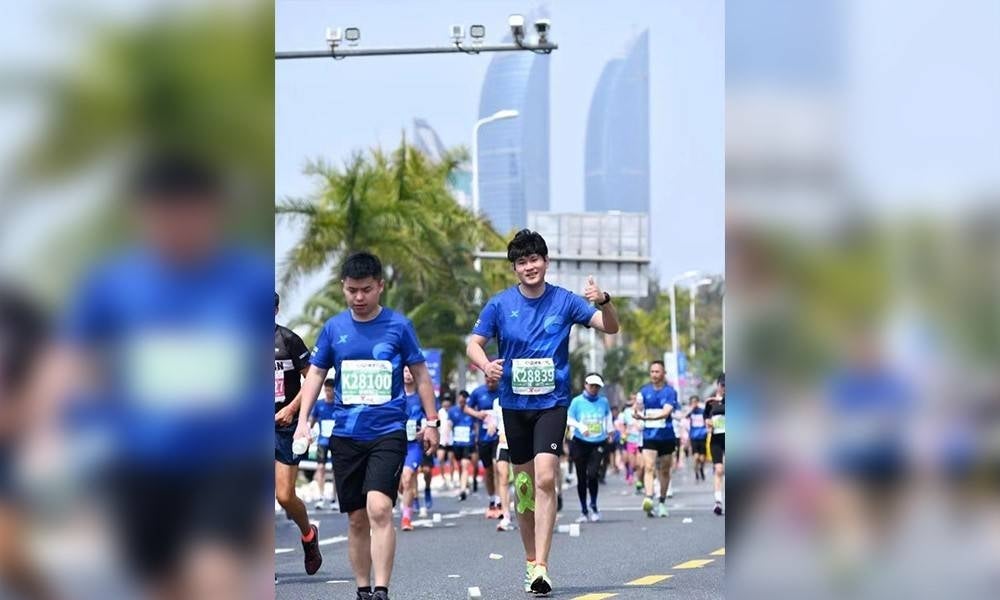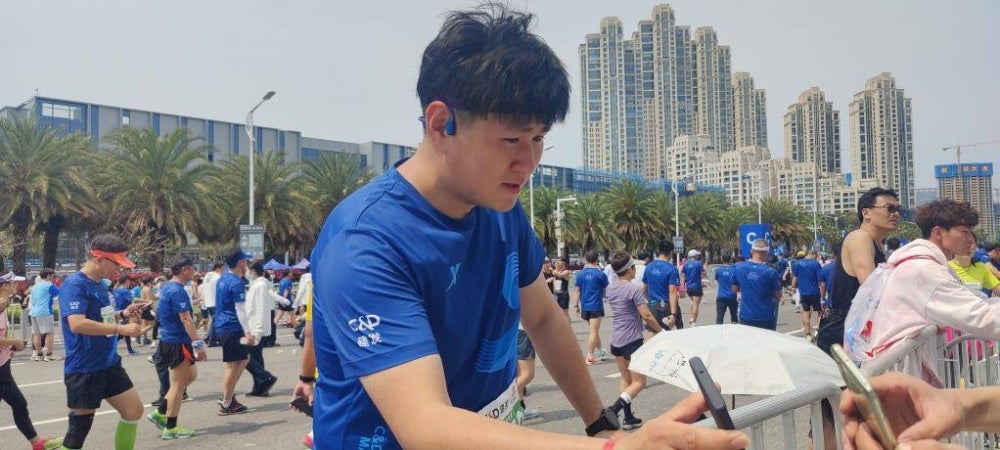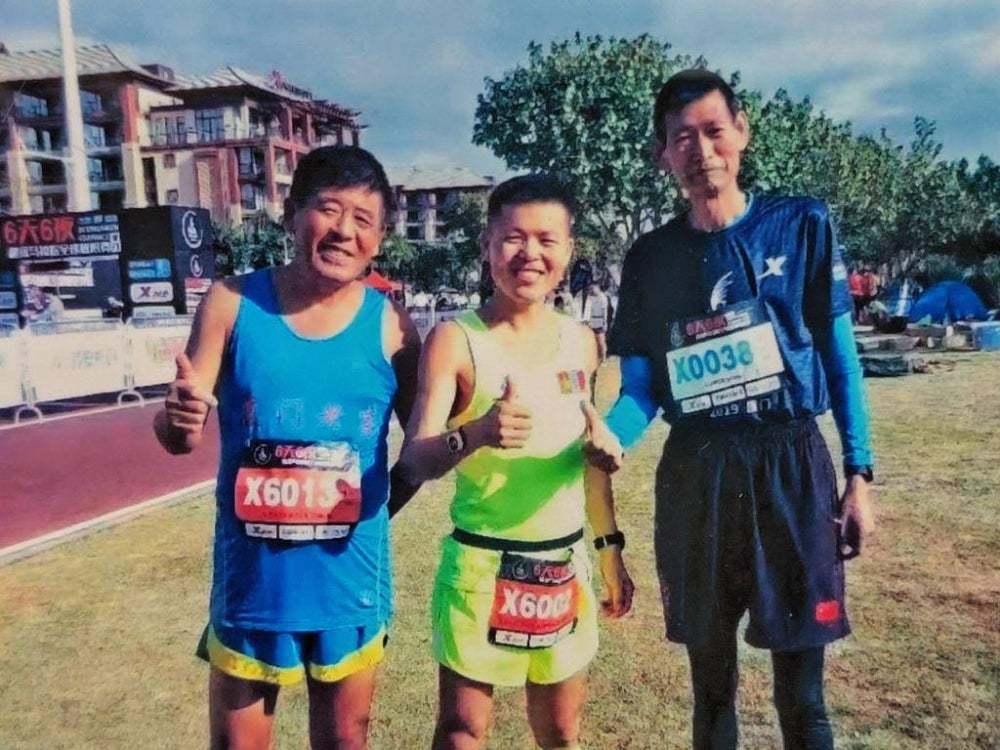Feature: A son helps his late father complete a 100-marathon dream

XIAMEN - He Shuai's vision was blurry from the tears. He felt thrilled and relieved when he crossed the finish line at the 2023 Xiamen Marathon on Sunday, 1183 days after his late father had completed his 61st and final marathon race - along the same race course.
The finish time - five hours and 40 minutes - is far below the average time for elite marathon runners, though it mattered little to He.
"Dad, I've completed a marathon and your dream now lives on, did you see?" He said to himself. He knows that his deceased father received the message.
"It's the best way to remember him," He said emotionally.

He never thought of becoming a marathon runner. In fact, he used to be an unfit and inactive person. The 33-year-old took up running in 2020, after the passing of his father, He Ming, who had vowed to complete 100 marathons despite being a stage 4 lung cancer patient.
The father finished his 61st and last marathon on January 5, 2020 - his 57th birthday - in Xiamen. Five months later, he died after having battled cancer for four years.
Now, his son has taken over the baton.
In his wife Zhang Liling's eyes, He Ming was an outspoken and forthright man. Standing 187cm tall, he used to be a fashion model. He also loved playing guitar and singing Teresa Teng's songs.
In April 2016, shortly after He Ming retired from a security management agency in his hometown in east China's Anhui Province, he received shocking news: a medical check revealed he had stage 4 lung cancer. Doctors told him he had just three months left to live.
"At the beginning, he stayed awake for nights, anxiously researching information about his illness online," Zhang Liling recalled.
He Ming soon came to terms with his diagnosis, putting on a brave face in front of people around him while seeking ways to improve his chances of survival.
Yet still, initial cycles of chemotherapy left him in extreme fragility and pain. His face was puffy, his back full of pustules, and he could barely do any physical work or even climb a set of stairs alone.
As conventional treatment could hardly cure his cancer, He Ming resorted to physical activities. "Lying on the hospital bed day and night is no different from waiting for death to come," He told his wife.
He began by standing up on his own feet until he could walk. Walking then transitioned into jogging, which eventually turned into running.
Against all odds, six months passed and He Ming's body was recovering, which boosted his determination to keep up physical exercise.
Nobody, however, knows exactly when He Ming decided to run marathons. His son guesses that it was a herd of amateur runners He Ming encountered during a walk in Shungeng Mountain that inspired him. "I think he was impressed by the vitality of those runners," says He Shuai.
Ever since November 2016, He Ming's lean figure was seen running regularly along the trail of Shungeng Mountain, a popular training site for local amateur runners. He then became well known among fellow runners of the Huainan Marathon Association - for his illness as well as his training intensity.
"Many of us were amazed by He's tenacity, as he had a running session each in the morning and evening, with a daily total of about 30 kilometers. He never stopped training, except for rainy and snowy days," said Liu Kaifu, president of the Huainan Marathon Association.
Initially, Zhang Liling and He Shuai both opposed He Ming's running regime. "I told him again and again 'You are overburdening your body. It harms your immunity. Your body cannot take it,'" said Zhang. "But he turned a deaf ear, repeating the same words, 'I know my body.' "
In October 2017, He Ming completed his first ever half-marathon in Huainan. His family didn't even know about it beforehand.
"We learned about it only a couple of days later," He Shuai said. "My mom was so worried that they had a quarrel, but he argued 'I'd rather die on a marathon course than on a hospital bed.'"
At that moment, He Shuai suddenly understood that running was how his father dealt with the curveball life threw at him. It had become an integral and essential part of his life. "My father often said 'I can't control the length of my life, but I can do something about its width,'" says He Shuai.
He Ming's doctor, Xie Jun, was also taken aback. "For a patient with stage 4 cancer, sitting still hurts, let alone running marathons," Xie said. "He was so different from other patients. He had an extremely strong will power, a powerful aspiration."
But few knew that He Ming always brought painkillers with him wherever he was running, according to He Shuai.
The following year He Ming went on to run marathons in nearby cities and later travelled to other provinces. In order to save money, he always bought the cheapest possible train tickets and booked the cheapest possible hotel rooms.

In July 2018, He Ming's story grabbed the media attention at the Guiyang Marathon, which made him realize that he could motivate more people to overcome adversities and create miracles.
From then on, he always donned the T-shirts with the slogan "Running marathons to battle cancer; Never stop running until I die" during races. People from across the country made phone calls to express their respect and support for He, hailing him as a warrior, and more people including his fellow patients became inspired to run marathons.
Unfortunately, a re-examination in 2019 found the cancer had recurred and spread to his bones. He Ming was still determined to continue running and wanted to squeeze in as many races as he could.
"My father calculated carefully his chemo dates and designed his race plan. Sometimes he went on a trip for a marathon just one day after being discharged from the hospital," said He Shuai.
On January 5, 2020, He Ming completed his 61st marathon in Xiamen. As he approached the finish line, his teammates and friends awaited him. They cheered and roared as he came down the track.
He's condition, however, deteriorated rapidly days after he returned home and was then hospitalized. This time, the dedicated runner couldn't get his strength back as cancer had spread to his brain and eventually took his life.
Even during his final days, He didn't stop training in the hospital until he couldn't stand up. "How I wish I could run one more marathon or half-marathon!" read the last post on He Ming's Wechat moments.
For He Shuai, his father was not only a determined warrior but also a kind person.
He Ming donated blood regularly until he was struck by cancer, so unsurprisingly, he signed up as an organ donor with the Red Cross Society of Anhui Province in 2019. At first, his wife and son were adamantly opposed, but He Ming kept trying to persuade them.
"Apart from running marathons, the other thing he mentioned the most was his plan to donate his organs," said He Shuai.
"He repeated saying that many people, including strangers, offered to help him after he was diagnosed with cancer, so he hoped to reward society as much as possible."
Finally, He Ming's family gave permission to his organ donation. The following day after his death, two patients received transplanted corneas and regained their eyesight.
Despite great affection for their parents, many Chinese remain too shy to express love for them. He Shuai is no exception. For as long as He Shuai could remember, he gave his father a hug only once before - when He Ming was confined to the hospital bed during his last hours.
"I used to dislike running, as I was busy with work. Now I really regret that I never ran a marathon together with my father," says He Shuai.
As a result, days after He Ming's funeral, He Shuai decided to carry on his father's unfinished dream by running 39 marathons for him.
First, though, there was a big hill to climb. He Shuai was winded even after walking a few hundreds of meters along the Shungeng Mountain trail, let alone running. After a few weeks of regular jogging, he was getting better and gradually built up his physical fitness.
In September 2020, He Shuai ran his first virtual half-marathon. Two months later, he completed his first full marathon in Nanjing.
Due to the COVID-19 pandemic, most marathons were canceled in China over the past three years. The 2023 Xiamen Marathon was only the second full marathon race that He Shuai has completed.
He Shuai suffered from a leg cramp midway through Sunday's race and was on the verge of quitting for a moment.
"I thought of my father running along the same course as if he was cheering me on and saying to me 'Son, you can do it.' So I managed to hold on," said He Shuai.
"After going through all of these hardships, I'm very impressed by the strength of my father.
"As a son, I feel so unspeakably proud of him." - XINHUA














